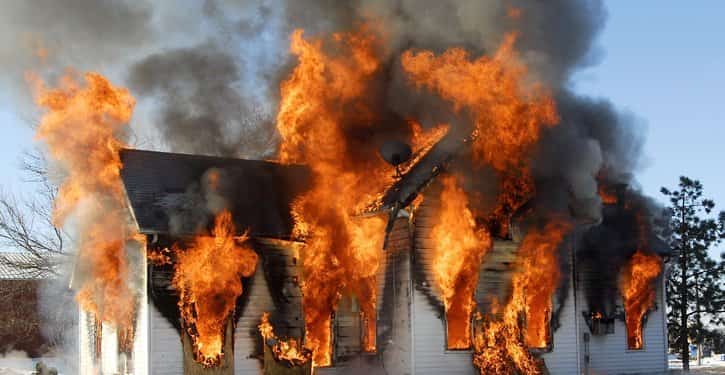House Fire Prevention Tips from Munn.
In recent weeks we have seen multiple news reports regarding house fires. Devastating news. The leading cause of fire-related injuries is from house fires that occur while cooking in the kitchen. Common causes of fires at night are carelessly discarded cigarettes, sparks from fireplaces without spark screens and heating appliances left too close to furniture. These fires can be particularly dangerous because they may smoulder for a long period before being discovered by sleeping residents.
House fires are preventable. The following are simple steps that each of us can take to prevent a tragedy.
Cooking
- Stay in the kitchen when you are frying, grilling or broiling food. If you leave the kitchen for even a short period of time, turn off the stove.
- Wear short, close-fitting or tightly rolled sleeves when cooking.
- Do not cook if you are sleepy, have been drinking alcohol or have taken medicine that makes you drowsy.
- Keep children away from cooking areas by enforcing a “kid-free zone” of 1 metre around the stove.
- Position grills at least 3 metres away from siding and deck railings, and out from under eaves and overhanging branches.
Smoking
- If you smoke, smoke outside. Most house fires caused by smoking materials start inside the home.
- Make sure cigarettes and ashes are out. The cigarette needs to be completely stubbed out in some kind of ashtray, such as a glass dish or a can filled with sand. Soak cigarette butts and ashes in water before throwing them away. Never toss hot cigarette butts or ashes in the trash can.
- Check for cigarette butts indoors. Chairs and sofas catch on fire fast and burn fast, so don’t put ashtrays on them. If people have been smoking in the home, check for cigarettes under cushions.
- Never smoke in a home where oxygen is used, even if it is turned off. Oxygen can be explosive and make the fire burn hotter and faster.
- Be alert—don’t smoke in bed! If you are sleepy, have been drinking or have taken medicine that makes you drowsy, put your cigarette out first.
Portable Space Heaters
- Keep combustible objects at least 1 metre away from portable heating devices.
- Buy only heaters evaluated by a nationally recognized laboratory, such as the Canadian Standards Association (CSA).
- Check to make sure the portable heater has a thermostat control mechanism, and will switch off automatically if the heater falls over.
- Check with your local fire department on the legality of kerosene heater use in your community.
- Only use crystal clear K-1 kerosene in kerosene heaters. Never overfill it. Use the heater in a well-ventilated room.
Fireplaces and Woodstoves
- Inspect and clean woodstove pipes and chimneys annually and check monthly for damage or obstructions.
- Never burn trash, paper or green wood.
- Use a fireplace screen heavy enough to stop rolling logs and big enough to cover the entire opening of the fireplace to catch flying sparks.
- Make sure the fire is completely out before leaving the house or going to bed.
- Store cooled ashes in a tightly sealed metal container outside the home.
Children
- Take the mystery out of fire by teaching children that fire is a tool, not a toy.
- Store matches and lighters out of children’s reach and sight, preferably in a locked cabinet.
- Teach children not to pick up matches or lighters they may find. Instead, they should tell an adult immediately.
- Never leave children unattended near operating stoves or burning candles, even for a short time.
- Check under beds and in closets for burned matches—evidence your child may be playing with fire.
More Prevention Tips
- Avoid using lighted candles.
- Never use the range or oven to heat your home.
- Keep combustible and flammable liquids away from heat sources.
- Portable generators should NEVER be used indoors and should only be refueled outdoors or in well-ventilated areas.
Electrical and Appliance Safety
- Frayed wires can cause fires. Replace all worn, old or damaged appliance cords immediately and do not run cords under rugs or furniture.
- Buy electrical products evaluated by a nationally recognized laboratory, such as the Canadian Standards Association (CSA).
- If an appliance has a three-prong plug, use it only in a three-slot outlet. Never force it to fit into a two-slot outlet or extension cord.
- Use electrical extension cords wisely; never overload extension cords or wall sockets.
- Immediately shut off, then professionally replace, light switches that are hot to the touch and lights that flicker.
In addition to insuring your home, Munn Insurance is committed to helping you and your loved ones stay safe when disaster strikes. If you would like more information on developing a family emergency plan or building a disaster supply kit, please contact us at 1-855-726-8627 or www.munninsurance.com today.
Related News
Recent News
How to Save on Insurance Amid Uncertainty of Tariffs and Trade Wars
In today’s global economy, trade wars and tariffs are a hot topic, and their potential impacts reach beyond just the cost of goods like cars, appliances, and steel. If tensions between countries like Canada and [...]
Get the Best Auto Insurance Quote in Nova Scotia: A Step by Step Guide
When it comes to auto insurance, everyone wants to ensure they’re getting the right coverage at the best price. Whether you're a first-time car owner or a seasoned driver in Nova Scotia, the process of [...]
Unlock Big Savings with Group Insurance Discounts
At Munn Insurance, we know that everyone loves saving money—especially when it comes to home and auto insurance. Did you know that you may qualify for exclusive discounts just by being part of certain groups [...]












